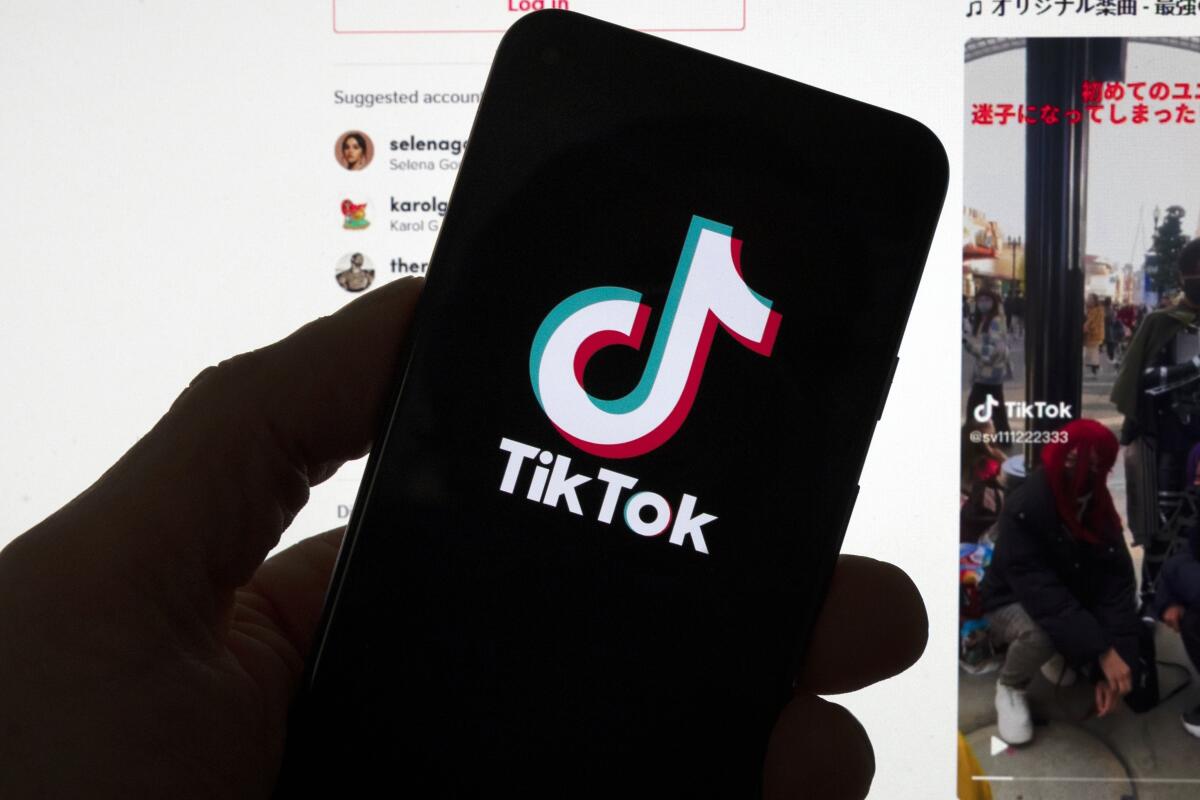Why the U.S. will probably never ban TikTok

- Share via
The world’s most downloaded app appears to be in hot water. The Biden administration demanded last week that the Chinese-owned TikTok be sold or else face a national ban in the U.S. due to security and privacy concerns, and the TikTok CEO will testify about these issues before Congress on Thursday.
The app presents genuine national security risks that the U.S. government must contend with. But the reality is that a nationwide ban or forced divestment would be hard to achieve.
Concerns have been mounting around TikTok’s alarming history around user data protection. A class-action lawsuit contending that the app sends private, personally identifiable data and biometrics to third parties without user consent settled for one of the largest payouts in the history of privacy lawsuits — $92 million — in 2021. The FBI and Justice Department are also investigating ByteDance, TikTok’s parent company, for using the app to surveil American citizens, including journalists. The U.S., United Kingdom, Canada and European Union have already banned TikTok on government devices. India banned the app nationwide in 2020.
The popular short-video app says a federal agency has said it will be banned in the United States unless its Chinese owners sell their shares. Not surprisingly, users are pushing back.
ByteDance relies on Chinese government approval to operate, subjecting it to pressures that firms such as Meta escape. Yet even while raising countless red flags because of its ownership structure and privacy concerns, TikTok is outcompeting other top social media firms in the U.S., hugely shaping how people get information and remaining extremely popular. The company counts more than 150 million active monthly users in the U.S. alone.
TikTok has already survived a ban attempt by the U.S. government. The Trump administration first proposed banning the app in 2020, but that effort was stopped by the federal courts, which questioned the solidity of the claims around national security risks and ruled that the move exceeded the scope of the administration’s emergency economic powers.
Banning the app additionally raises significant 1st Amendment concerns. In 2020, alongside the proposed ban on TikTok, the Trump administration tried to ban WeChat, a Chinese-owned messaging and social media app. But the U.S. District Court for the Northern District of California ruled that because of WeChat’s role as the only means through which many individuals could reliably communicate in China, the app constituted a unique form of communication. Blocking its use would thus violate users’ 1st Amendment rights. While TikTok does not play the same basic communication role, similar arguments for the app’s distinctiveness as a communication tool could subject any bans on private citizen use to extensive, time-consuming legal scrutiny.
For now, in lieu of a ban, the Biden administration proposes that ByteDance sell TikTok. There is some precedent for this process, including the U.S. government’s successful effort to change the ownership of Grindr via the federal multi-agency Committee on Foreign Investment in the United States (which is reviewing TikTok). In March 2019, the Committee used the authority granted to it by the Foreign Investment Risk Review Modernization Act to require Grindr’s then-owner, the Chinese company Beijing Kunlun Tech Co. Ltd., to sell, citing U.S. national security concerns over the app’s access to sensitive personal information. A little more than a year after the forced divestment was announced, Grindr was acquired by an investment group called San Vicente Acquisition Partners, based in West Hollywood.
Citing online security concerns, the O.C. Board of Supervisors declared that county employees can no longer use TikTok on government phones and computers.
But since that sale, China has created guardrails to protect TikTok and other Chinese tech firms. Amid legal challenges to the TikTok ban, the Trump administration tried to force TikTok’s sale to a U.S. company. But China’s Ministry of Commerce then updated its list of “forbidden or restricted technology exports” to include “personalized information recommendation services based on data analysis.” What this meant in practice was that the Chinese government would need to consent to any sale of TikTok that would allow foreign companies to access the app’s algorithm.
The Chinese government has also implemented a law that allows national security data audits of all Chinese firms, including ByteDance, and taken golden shares, or a government financial stake, in a ByteDance subsidiary. Adding to that, TikTok’s widespread prevalence presents an opportunity for ByteDance to acquire more users and develop robust new technologies in fields such as AI, deep fakes and facial recognition. Under China’s civil-military fusion program, those technologies also become Chinese national security assets. Any TikTok divestment would probably require Chinese government cooperation on a transaction that works against its interests.
For the U.S., the political costs of a TikTok ban will increase the longer there is no resolution. More users join the app every day, making it a more essential communication tool. Concerns about TikTok’s security might be bipartisan, but they have yet to overcome the popularity of the social media app.
Aynne Kokas is the author of “Trafficking Data: How China is Winning the Battle for Digital Sovereignty.”
More to Read
A cure for the common opinion
Get thought-provoking perspectives with our weekly newsletter.
You may occasionally receive promotional content from the Los Angeles Times.











